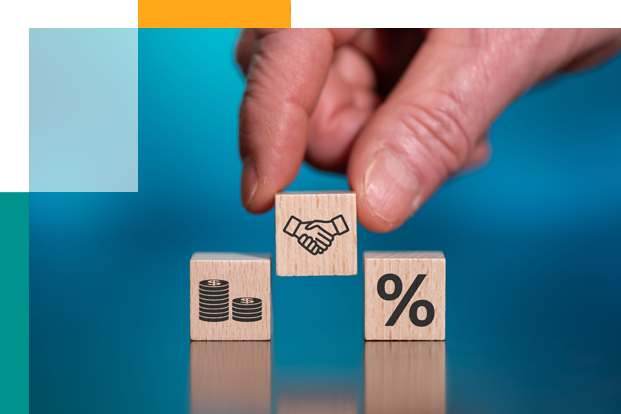Commercial Mortgage Rates: Explained

For firms wishing to refinance existing debt or fund real estate purchases, commercial mortgage rates are an essential factor to consider. These rates can differ significantly based on the lender, the borrower’s creditworthiness, and the financed property type, among other variables.
Understanding the elements influencing commercial mortgage rates will assist borrowers in making informed decisions about funding their commercial real estate needs. In this article, we will look at some essential variables affecting commercial mortgage rates and advise borrowers trying to get the best rates on their commercial real estate investments.
What Is a Commercial Real Estate Loan?
A commercial real estate loan is any loan used to acquire or take action on real estate in connection with a business enterprise. Commercial mortgage loans can finance many projects, including purchasing hotels, motels, apartment buildings, condo buildings, office buildings, and much more.
Even though commercial property loan rates can vary from residential loan rates, commercial real estate loans are similar to other real estate loans in many ways. They occasionally demand an origination fee.
What Is the Current Interest Rate for Commercial Mortgages? *
*As of 3/1/1023
| Multifamily | 5 Year | 7 Year | 10 Year | |||
| BANK | 6.10% | 6.35% | 6.42% | |||
| AGENCY | 5.72% | 5.57% | 5.40% | |||
| AGENCY SBL | 5.73% | 5.83% | 5.79% | |||
| CMBS | 6.47% | 6.42% | 6.12% | |||
| Commercial | 5 Year | 7 Year | 10 Year | |||
| BANK | 6.30% | 6.58% | 6.42% | |||
| CMBS | 6.62% | 6.57% | 6.27% | |||
What Type of Property Qualifies for a Commercial Loan?
Most property types with an income-generating potential are eligible for commercial mortgage loans. This includes purchasing hotels, motels, apartments, offices, warehouses, self-storage facilities, shopping malls, condo developments, and other multifamily real estate.
How Are Commercial Loan Rates Determined?
Generally speaking, the market determines the standard rates for commercial loans. Depending on various economic factors at play at any particular time, interest rates may decline and then rise again. Your creditworthiness, the terms of the loan, and other factors will affect the rates of your commercial loans individually.
The best commercial mortgage rates are generally only available to borrowers with excellent credit, a sizeable down payment, and a track record of making their other loan payments on schedule.
Why Use a Commercial Real Estate Loan?
Although investing in commercial real estate buildings can be profitable, most people lack the funds to buy them outright. A commercial real estate loan can help with that. These loans provide you with the upfront capital you need to buy the property, and you eventually repay the lender through a commercial mortgage.
In this sense, you can consider commercial mortgage loans quite similar to residential mortgage loans that you might use to buy a home. Commercial real estate loans can be used by anyone, from large businesses to small business owners, to purchase an investment property, upgrade or remodel existing investment properties, or carry out other duties.
Commercial Real Estate Loan Types?
There are various loan types for various conditions, even though all commercial real estate loans have the same bird’s-eye structure. For instance, a bridge loan is intended to have a brief tenure of six months to a year. Until more long-term funding can be made available, these loans offer the funds needed to make a purchase.
The terms of a bridge loan differ from those of a conventional loan product in that they have brief terms and high-interest rates. Still, the latter is not particularly significant given the loan’s short duration.
What Is the Difference Between Residential and Commercial Interest Rates?
Even though there can be slight differences, residential and commercial interest rates often follow similar broad trends. Commercial loans typically have longer loan durations and higher interest rates.
Choosing the Right Commercial Real Estate Loan
How do you tell which kind of mortgage is best for you? Consult the professionals if you’re unsure what type of loan would provide you with the best rates, loan size, loan-to-value ratio, and maximum term; contact one of our Finance Lobby experts.
What Determines Commercial Leveraging Finality?
The published mortgage loan rates serve as crucial benchmarks. These rates should not be viewed as a loan offer, nevertheless. The following are a few of the many variables that affect commercial mortgage rates:
- Debt type
- Repayment option
- Loan term option
- Bank or credit union
- Line-of-credit
- Broker network
A commercial mortgage with a 75% LTV is also applied as an underlying assumption to all rates as given. Lower LTV inevitably results in cheaper commercial mortgage rates. The index rates are flexible and depend on a number of variables. You require the assistance of a qualified broker when applying for commercial real estate mortgages.
Key Drivers of Commercial Mortgage Rates
GDP: An important factor that affects interest rates is data on the gross domestic product. More projected growth can raise interest rates because it pressures inflation and capital demand.
On the other hand, when it diminishes, interest rates will decrease.
Inflation: Inflation refers to an increase in the price level of an economy over time. Principal and interest rates fluctuate together with the price level. In other words, mortgage rates rise in direct proportion to inflation rates.
Commercial Mortgage Rate Spreads: This is another important factor influencing interest rates. The supply and demand for capital and the risk controls spread. Spreads will decrease as capital supply increases and increase as capital demand increases.
Employment Data and Payroll: Every time there is a labor shortage, hourly wages rise, which is viewed as inflationary. The yield curve would experience upward pressure on interest rates as a result. On the other hand, rates decline due to rising unemployment and reduced payroll figures.
Can You Get a 30-Year Mortgage on Commercial Property?
Although they do exist, 30-year commercial mortgages are somewhat uncommon and often only offered by non-bank commercial real estate lenders.
Are Commercial Mortgage Rates Higher Than Residential?
In general, yes. The ups and downs of commercial mortgage rates are similar to those of residential rates, but they are often a little higher.
How Much Is a Commercial Mortgage?
A commercial mortgage’s amount is determined by several variables, including the value of the property being financed, the borrower’s creditworthiness, the lender’s underwriting guidelines, and the loan-to-value ratio (LTV) the lender is ready to offer. Commercial mortgages typically range in value from a few hundred thousand to several million dollars.
What Are Historical Commercial Mortgage Rates?
In the past, commercial mortgage rates have varied considerably with the market. They have, on average, ranging between 2% and 5%.
What to Consider When Shopping for a Commercial Mortgage?
When shopping for a commercial mortgage, your top priority should be the advantages of working with an experienced broker who can navigate the complicated world of business lending and locate the ideal lender, terms, and repayment rate for your requirements.
Conclusion
Commercial mortgage rates can vary significantly depending on various criteria, such as the lender, the borrower’s creditworthiness, the type of property being funded, and the present state of the economy. When taking out a commercial mortgage, it’s crucial for borrowers to do their homework, compare rates from various lenders, and speak with a financial advisor.
Monitoring market dynamics and interest rate swings can also help you make smart commercial real estate finance decisions. You can connect with the best lenders with the best rates on Finance Lobby. We at Finance Lobby are changing the CRE lending sector. We link borrowers and lenders together seamlessly. Sign up now to get the best deals.


